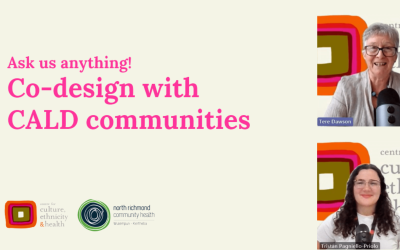Stay up to date with CEH News
Scroll down for the latest news
Click on monthly newsletter
Subscribe to our Newsletter
Coronavirus (COVID-19) Multilingual Resources & Information
We do this through:
Training for Service Providers
We deliver engaging training in:
- Health Literacy
- Cultural Competence
- Understanding the NDIS
- Language Services
Multicultural Health and Support Service (MHSS)
- Community Education Sessions
- Peer Education Projects
- Community Action Projects
- Professional Development
Resource Hub
- Migrant & refugee health library
- Disability in CALD communities
- Health Translations
- Using Language Services
Cultural Consultancy
Our Expertise
Project Management
Health Translations aims to improve the health of people from culturally and linguistically diverse backgrounds. We do this by providing health professionals and community members with reliable, accurate, and up to date health information in many different languages.
Cultural Competence
Cultural competence is our expertise
We can help you become more culturally competent through:
- our training programs
- cultural competence audit
- cultural competence resources
Health Literacy
We focus on health literacy
We offer training, consultancy and resources to improve the health literacy of people in Australia. Our services include:
- health literacy course
- health literacy workshops
- health literacy resources
Sexual Health & blood-borne viruses
We are experienced in sexual health and blood-borne viruses. We focus on sexual health and blood-borne viruses in the Multicultural Health and Support Service:
- Multicultural Sexual Health Network Forum
- Multicultural Community Action Network
- Youth Ambassadors Program
Latest News
CEH is all grown up! 30th birthday celebrations.
On 17th September 2024, CEH celebrated its 30th anniversary with staff and friends from organisations that have worked with us over the years on projects, training and partnerships. A great opportunity for all of us at CEH to reconnect and catch up on what’s happening in the sector.
Connecting with communities using Health Literacy principles
Plain language is essential for effective communication. When health information is presented in plain language, it is easier for people to understand. This is particularly important when dealing with diverse communities where English may not be the first language for many residents.
Co-design: what, why and how?
We know that collaboration is an important step in engaging diverse communities in services, particularly those that face certain barriers such as linguistic and cultural differences, lack of awareness of services, and limited access to information. So, how can we collaborate with these communities? Read on for our thoughts.



